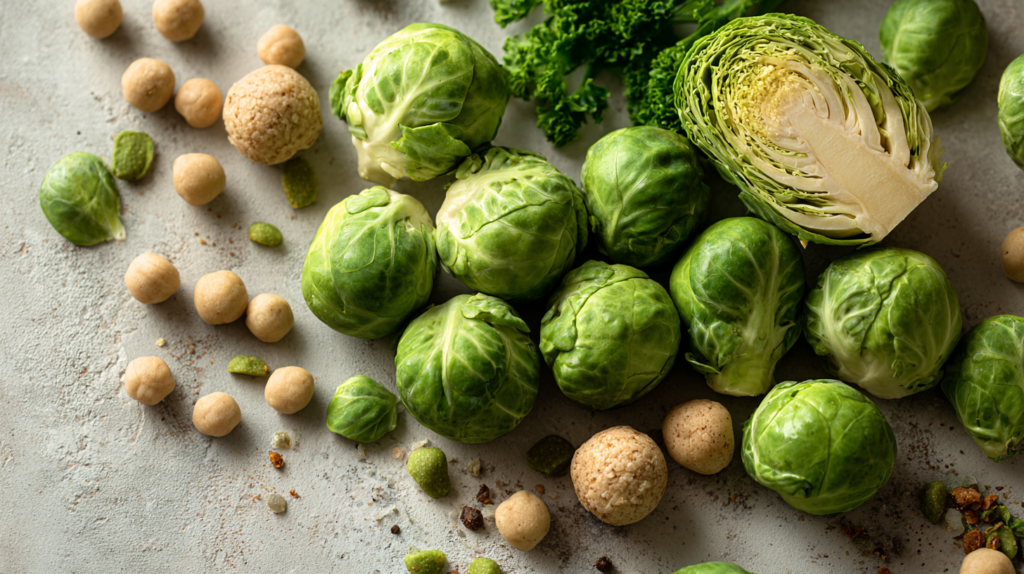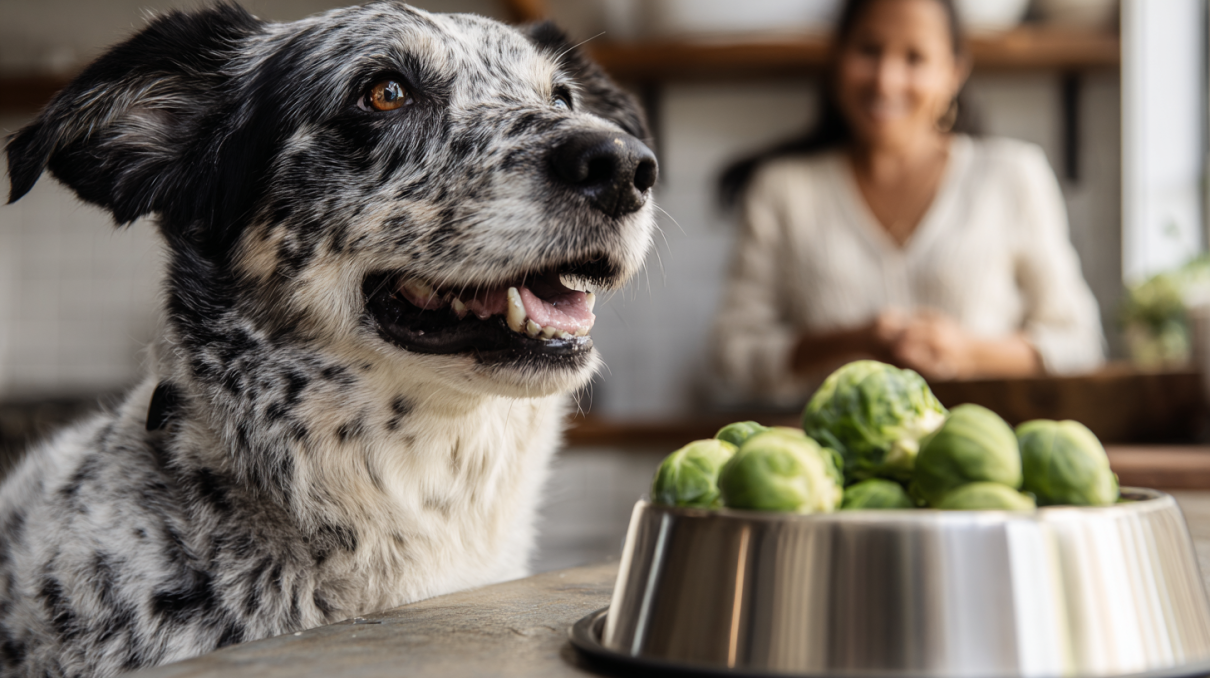Can Dogs Eat Brussel Sprouts? Discover 5 powerful health benefits, safe feeding tips, and expert veterinary advice for your dog’s nutrition and wellness.
Table of Contents
Did you know that 68% of pet owners regularly share human food with their dogs, yet only 23% know which vegetables are actually safe for canine consumption? If you’ve ever wondered whether your furry friend can enjoy those nutritious green Brussels sprouts from your dinner plate, you’re not alone. This comprehensive guide will reveal everything you need to know about feeding Brussels sprouts to your dog, including five remarkable health benefits that might surprise you.
Can Dogs Eat Brussel Sprouts? Yes, dogs can safely eat Brussels sprouts in moderation. These miniature cabbage-like vegetables are not only safe for dogs but can also provide significant nutritional benefits when prepared and served correctly. However, like any human food, Brussels sprouts should be given as an occasional treat rather than a dietary staple, and proper preparation is essential to ensure your dog’s safety and digestive comfort.
Brussels sprouts belong to the cruciferous vegetable family, which includes broccoli, cauliflower, and kale. These vegetables are packed with essential nutrients that can support your dog’s overall health, from boosting immune function to promoting healthy digestion. Throughout this article, we’ll explore the science-backed benefits, proper preparation methods, and important safety considerations that every responsible pet owner should understand before adding Brussels sprouts to their dog’s diet.
What Makes Brussels Sprouts Special for Dogs

Brussels sprouts are nutritional powerhouses that offer dogs a wealth of essential vitamins, minerals, and antioxidants. Understanding the specific nutritional profile of these vegetables helps pet owners make informed decisions about their dog’s diet and appreciate why veterinarians often recommend cruciferous vegetables as healthy treats.
Each Brussels sprout contains high levels of vitamin K, which plays a crucial role in blood clotting and bone health. Dogs require adequate vitamin K for proper wound healing and maintaining strong bones throughout their lives. Additionally, Brussels sprouts are rich in vitamin C, an antioxidant that supports immune function and helps protect cells from oxidative damage.
The fiber content in Brussels sprouts is particularly beneficial for dogs with digestive issues. Dietary fiber promotes healthy gut bacteria, aids in regular bowel movements, and can help dogs feel satiated without consuming excessive calories. This makes Brussels sprouts an excellent treat option for overweight dogs or those requiring weight management.
Brussels sprouts also contain significant amounts of folate, which is essential for DNA synthesis and red blood cell formation. This B-vitamin is particularly important for pregnant dogs and growing puppies, though these groups should only consume Brussels sprouts under veterinary supervision.
The presence of glucosinolates, sulfur-containing compounds unique to cruciferous vegetables, gives Brussels sprouts their distinctive flavor and provides powerful anti-inflammatory properties. These compounds have been studied extensively in human nutrition and show promise for supporting long-term health in dogs as well.
5 Powerful Health Benefits of Brussels Sprouts for Dogs
1. Enhanced Immune System Support
Brussels sprouts provide exceptional immune system support through their high concentration of vitamin C and antioxidants. While dogs naturally produce vitamin C in their bodies, unlike humans, additional dietary sources can boost their immune response, especially during times of stress, illness, or aging.
The antioxidants in Brussels sprouts, including vitamin C, vitamin A, and various phytonutrients, help neutralize free radicals that can damage cells and contribute to aging and disease. Regular consumption of antioxidant-rich foods like Brussels sprouts may help reduce the risk of chronic diseases and support overall longevity in dogs.
A study published in the Journal of Animal Physiology found that dogs consuming diets supplemented with cruciferous vegetables showed improved immune markers and reduced inflammation compared to control groups. This suggests that Brussels sprouts can be a valuable addition to a dog’s diet for maintaining optimal immune function.
2. Digestive Health and Regularity
The high fiber content in Brussels sprouts makes them excellent for promoting digestive health in dogs. Fiber acts as a prebiotic, feeding beneficial bacteria in the gut and promoting a healthy microbiome. This is particularly important for dogs recovering from antibiotic treatment or those with digestive sensitivities.
Brussels sprouts contain both soluble and insoluble fiber, each serving different purposes in digestive health. Soluble fiber helps regulate blood sugar levels and can reduce cholesterol, while insoluble fiber adds bulk to stool and promotes regular bowel movements.
For dogs prone to constipation, the fiber in Brussels sprouts can provide gentle relief when given in appropriate amounts. However, it’s crucial to introduce fiber gradually to avoid digestive upset, as sudden increases can cause gas, bloating, or diarrhea.
3. Anti-Inflammatory Properties
The glucosinolates found in Brussels sprouts have powerful anti-inflammatory effects that may benefit dogs with arthritis, allergies, or other inflammatory conditions. These compounds work by inhibiting inflammatory pathways and reducing the production of inflammatory markers in the body.
Research in veterinary nutrition has shown that dogs consuming anti-inflammatory foods show reduced joint pain and improved mobility. While Brussels sprouts shouldn’t replace prescribed anti-inflammatory medications, they can serve as a supportive dietary component for dogs with chronic inflammatory conditions.
The omega-3 fatty acids present in small amounts in Brussels sprouts also contribute to their anti-inflammatory effects. These essential fatty acids are crucial for maintaining healthy skin, coat, and joint function in dogs.
4. Cancer Prevention Support
Brussels sprouts contain compounds that may help prevent certain types of cancer in dogs. The glucosinolates mentioned earlier break down into isothiocyanates, which have been studied for their cancer-fighting properties in both humans and animals.
These compounds work by supporting the body’s natural detoxification processes and may help prevent the formation of cancerous cells. While more research is needed specifically in dogs, the cancer-preventive properties of cruciferous vegetables are well-documented in scientific literature.
The high antioxidant content in Brussels sprouts also contributes to cancer prevention by protecting cells from DNA damage that can lead to cancerous changes. This makes Brussels sprouts a valuable addition to a cancer-prevention diet for dogs.
5. Heart Health and Cardiovascular Support
Brussels sprouts support cardiovascular health in dogs through multiple mechanisms. The fiber content helps regulate cholesterol levels, while the potassium supports healthy blood pressure regulation. Additionally, the folate in Brussels sprouts helps reduce homocysteine levels, which can contribute to heart disease when elevated.
The antioxidants in Brussels sprouts also protect the cardiovascular system by preventing oxidative damage to blood vessels and supporting healthy circulation. This is particularly important for older dogs or breeds predisposed to heart conditions.
Studies have shown that dogs consuming diets rich in vegetables, including cruciferous varieties like Brussels sprouts, have lower rates of cardiovascular disease and better overall heart health markers compared to dogs eating standard commercial diets alone.
How to Safely Prepare Brussels Sprouts for Your Dog
Proper preparation is essential when feeding Brussels sprouts to dogs. Raw Brussels sprouts can be difficult for dogs to digest and may cause more gas and digestive upset than cooked varieties. The best preparation methods include steaming, boiling, or roasting without added oils, seasonings, or spices.
When steaming Brussels sprouts for your dog, cook them until they’re tender but not mushy, typically 8-10 minutes. This cooking method preserves most of the nutritional value while making the vegetables more digestible. Avoid adding salt, butter, oil, or any seasonings that could be harmful to your dog.
If you choose to roast Brussels sprouts, do so without oil or seasonings. Simply cut them in half and roast at 400°F for 15-20 minutes until tender. This method can make the vegetables more appealing to dogs who might be hesitant about their bitter taste.
Always allow cooked Brussels sprouts to cool completely before offering them to your dog. Cut them into appropriate sizes based on your dog’s size to prevent choking hazards. For small dogs, quarter the sprouts; for medium dogs, halve them; and large dogs can typically handle whole cooked Brussels sprouts.
Remove any outer leaves that appear wilted or damaged before cooking. Fresh Brussels sprouts should be firm, bright green, and free from yellowing or dark spots. Frozen Brussels sprouts are also acceptable and can be more convenient for pet owners.
Portion Control and Feeding Guidelines
The key to safely feeding Brussels sprouts to dogs lies in moderation and proper portion control. Brussels sprouts should never constitute more than 10% of your dog’s daily caloric intake, following the standard guideline for treats and supplemental foods.
For small dogs (under 20 pounds), one or two cooked Brussels sprouts per week is appropriate. Medium dogs (20-50 pounds) can safely enjoy 2-3 Brussels sprouts weekly, while large dogs (over 50 pounds) can handle 3-4 Brussels sprouts per week without digestive issues.
It’s important to introduce Brussels sprouts gradually into your dog’s diet. Start with a small piece of cooked Brussels sprout and monitor your dog’s reaction over 24-48 hours. If no digestive upset occurs, you can gradually increase the portion size to the recommended amount.
Always account for Brussels sprouts in your dog’s overall daily calorie intake. If you’re feeding Brussels sprouts as a treat, reduce the amount of regular treats accordingly to maintain a balanced diet and prevent weight gain.
Consider your dog’s individual digestive sensitivity when determining portion sizes. Some dogs may tolerate Brussels sprouts better than others, and senior dogs or those with sensitive stomachs may require smaller portions or less frequent feeding.
Potential Risks and Side Effects to Watch For
While Brussels sprouts are generally safe for dogs, there are several potential risks and side effects that pet owners should be aware of. The most common issue is excessive gas production, which occurs due to the high fiber content and certain compounds in cruciferous vegetables.
Dogs with sensitive stomachs may experience diarrhea, vomiting, or abdominal discomfort if they consume too many Brussels sprouts or if the vegetables are introduced too quickly into their diet. This is why gradual introduction and proper portion control are essential.
Brussels sprouts contain goitrogens, compounds that can interfere with thyroid function if consumed in very large quantities over extended periods. While this is rarely a concern with moderate consumption, dogs with existing thyroid conditions should only eat Brussels sprouts under veterinary supervision.
Some dogs may experience allergic reactions to Brussels sprouts, though this is uncommon. Signs of food allergies in dogs include itching, skin irritation, digestive upset, or respiratory symptoms. If you notice any of these signs after feeding Brussels sprouts, discontinue use and consult your veterinarian.
The high vitamin K content in Brussels sprouts can potentially interfere with blood-thinning medications if your dog is on anticoagulant therapy. Always consult your veterinarian before adding Brussels sprouts to the diet of a dog taking any medications.
When to Consult Your Veterinarian
While Brussels sprouts are generally safe for healthy dogs, there are specific circumstances when veterinary consultation is necessary before introducing them into your dog’s diet. Dogs with existing health conditions, particularly those affecting the digestive system, kidneys, or thyroid, should only consume Brussels sprouts under professional guidance.
If your dog has a history of food allergies or sensitivities, discuss adding Brussels sprouts to their diet with your veterinarian first. They can provide personalized advice based on your dog’s specific health needs and medical history.
Dogs taking medications, especially blood thinners, thyroid medications, or drugs that affect blood sugar, should not consume Brussels sprouts without veterinary approval. The nutrients in Brussels sprouts can interact with certain medications and affect their effectiveness.
Pregnant or nursing dogs have unique nutritional needs, and while Brussels sprouts can be beneficial, the timing and amount should be determined by a veterinary professional to ensure optimal health for both mother and puppies.
If your dog experiences any adverse reactions after eating Brussels sprouts, including persistent vomiting, diarrhea, lethargy, or changes in appetite, contact your veterinarian immediately. These symptoms could indicate an allergic reaction or digestive intolerance that requires professional attention.
Common Mistakes Pet Owners Make with Brussels Sprouts
One of the most common mistakes pet owners make is feeding Brussels sprouts with seasonings, oils, or other additives that can be harmful to dogs. Garlic, onions, salt, and butter are particularly dangerous and should never be used when preparing Brussels sprouts for dogs.
Many pet owners also make the mistake of feeding too many Brussels sprouts at once, leading to digestive upset and excessive gas. Remember that moderation is key, and Brussels sprouts should complement, not replace, a balanced commercial dog food.
Another frequent error is feeding raw Brussels sprouts to dogs. While not toxic, raw Brussels sprouts are much harder for dogs to digest and more likely to cause gas and stomach upset compared to properly cooked varieties.
Some pet owners assume that because Brussels sprouts are healthy for humans, they can feed unlimited amounts to their dogs. This thinking can lead to nutritional imbalances and digestive issues, as dogs have different nutritional requirements than humans.
Failing to properly prepare Brussels sprouts by removing damaged outer leaves or not cutting them to appropriate sizes for the dog’s size can create choking hazards or digestive blockages, particularly in smaller dogs.
Myth-Busting: Common Misconceptions About Dogs and Brussels Sprouts
Myth 1: Brussels sprouts are toxic to dogs. This is completely false. Brussels sprouts are safe for dogs when prepared and served appropriately. The confusion may arise from the fact that some cruciferous vegetables can cause digestive upset if overfed, but this doesn’t make them toxic.
Myth 2: Dogs can eat unlimited amounts of Brussels sprouts because they’re vegetables. This is dangerous thinking. While Brussels sprouts are healthy, they should only comprise a small portion of a dog’s diet. Overfeeding can lead to digestive issues and nutritional imbalances.
Myth 3: All dogs will experience excessive gas from Brussels sprouts. While gas is a common side effect, not all dogs will experience it, especially when Brussels sprouts are introduced gradually and fed in appropriate amounts. Proper preparation and portion control can minimize this issue.
According to recent veterinary nutrition research, these myths persist because of incomplete information sharing among pet owners and the tendency to overgeneralize individual experiences to all dogs.
Alternative Vegetables for Dogs: Expanding Your Options
While Brussels sprouts offer excellent nutritional benefits, they’re not the only healthy vegetable option for dogs. Broccoli, cauliflower, and green beans are also safe, nutritious alternatives that many dogs enjoy and digest well.
Carrots are another excellent choice, providing beta-carotene and fiber while also serving as a natural teeth-cleaning treat. Sweet potatoes offer vitamins A and C along with fiber, making them a nutritious and often more palatable option for picky eaters.
Leafy greens like spinach and kale can be beneficial for dogs, though they should be fed in even smaller quantities than Brussels sprouts due to their higher oxalate content. Always research any new vegetable thoroughly before adding it to your dog’s diet.
For dogs who don’t enjoy the taste of Brussels sprouts, mixing small amounts with their regular food or combining them with more appealing vegetables like carrots can help with acceptance while still providing nutritional benefits.
Creating a Balanced Diet: Where Brussels Sprouts Fit In
Brussels sprouts should be viewed as a supplemental addition to a complete and balanced commercial dog food, not as a replacement for essential nutrients. High-quality commercial dog foods are formulated to meet all of a dog’s nutritional needs, and vegetables like Brussels sprouts serve as healthy treats or supplements.
When incorporating Brussels sprouts into your dog’s diet, consider the overall balance of nutrients. If your dog is already receiving adequate fiber from their regular food, adding Brussels sprouts should be done cautiously to avoid digestive upset.
The 90/10 rule applies here: 90% of your dog’s calories should come from complete and balanced commercial dog food, while treats and supplements like Brussels sprouts should comprise no more than 10% of their daily caloric intake.
Work with your veterinarian to create a feeding plan that incorporates healthy treats like Brussels sprouts while maintaining optimal nutrition for your dog’s specific life stage, size, and health status.
Expert Tips for Success
Start Small: Always begin with tiny amounts of cooked Brussels sprouts to gauge your dog’s tolerance and preference. Even a small piece of one Brussels sprout is enough for an initial trial.
Cook Thoroughly: Steam or boil Brussels sprouts until they’re tender but not mushy. This makes them easier to digest while preserving most of their nutritional value.
Monitor Closely: Watch for any signs of digestive upset, including gas, bloating, diarrhea, or changes in appetite, especially during the first few feedings.
Maintain Consistency: If your dog tolerates Brussels sprouts well, maintain a regular feeding schedule rather than offering them sporadically to help their digestive system adjust.
Age Considerations: Puppies under 6 months should not receive Brussels sprouts, as their digestive systems are still developing. Senior dogs may need smaller portions due to potentially reduced digestive efficiency.
Seasonal Freshness: Fresh Brussels sprouts are best from fall through early spring when they’re in season. This ensures optimal nutritional content and flavor.
Storage Tips: Store fresh Brussels sprouts in the refrigerator and use them within a week of purchase. Cooked Brussels sprouts can be stored in the refrigerator for up to three days.
Preparation Variety: Try different cooking methods to see which your dog prefers. Some dogs enjoy the slightly caramelized flavor of roasted Brussels sprouts, while others prefer the milder taste of steamed varieties.
Signs Your Dog is Enjoying Brussels Sprouts
Dogs who enjoy Brussels sprouts will typically eat them readily without hesitation or excessive sniffing. They may show excitement when they see you preparing Brussels sprouts, especially if they’ve learned to associate the preparation with treat time.
Positive signs include normal digestion after eating Brussels sprouts, with regular bowel movements and no signs of discomfort. Dogs who tolerate Brussels sprouts well will maintain their usual energy levels and appetite.
Some dogs may initially be hesitant about the slightly bitter taste of Brussels sprouts but will gradually develop a preference for them, especially when they’re prepared consistently and offered as part of a positive feeding routine.
Watch for your dog’s individual preferences regarding preparation methods. Some dogs prefer softer, well-cooked Brussels sprouts, while others enjoy them with a bit more texture.
Educational Table
Markdown Version:
| Dog Size | Weekly Portion | Preparation Method | Frequency | Special Notes |
|---|---|---|---|---|
| Small Dogs (<20 lbs) | 1-2 Brussels sprouts | Steam 8-10 minutes, quarter them | 1-2x per week | Monitor for gas, start with 1/4 sprout |
| Medium Dogs (20-50 lbs) | 2-3 Brussels sprouts | Steam 8-10 minutes, halve them | 2-3x per week | Good for weight management |
| Large Dogs (>50 lbs) | 3-4 Brussels sprouts | Steam 8-10 minutes, whole or halved | 2-3x per week | Can handle larger portions |
| Senior Dogs (All sizes) | Reduce by 25% | Steam until very tender | 1-2x per week | Easier digestion needed |
| Puppies (6+ months) | 1/4 to 1/2 sprout | Steam until very soft | Once weekly | Only with vet approval |
Frequently Asked Questions
Can dogs eat Brussels sprouts every day?
No, dogs should not eat Brussels sprouts every day. They should be given as an occasional treat, 1-3 times per week depending on your dog’s size, to prevent digestive upset and maintain a balanced diet.
Are Brussels sprouts safe for puppies?
Brussels sprouts can be safe for puppies over 6 months old in very small amounts, but only with veterinary approval. Puppies have sensitive digestive systems and should primarily eat puppy-formulated food.
Why do Brussels sprouts make my dog gassy?
Brussels sprouts contain high fiber and sulfur compounds that can cause gas in dogs. This is normal but can be minimized by feeding smaller portions, cooking them thoroughly, and introducing them gradually.
Can I feed my dog raw Brussels sprouts?
While not toxic, raw Brussels sprouts are harder for dogs to digest and more likely to cause gas and stomach upset. It’s better to steam or boil them until tender before serving.
How should I prepare Brussels sprouts for my dog?
Steam or boil Brussels sprouts for 8-10 minutes until tender, then cool completely. Cut them into appropriate sizes for your dog and never add seasonings, oils, or butter.
Are there any dogs that shouldn’t eat Brussels sprouts?
Dogs with thyroid conditions, those on blood-thinning medications, or dogs with severe digestive sensitivities should avoid Brussels sprouts unless approved by their veterinarian.
What are the signs that my dog is eating too many Brussels sprouts?
Signs include excessive gas, diarrhea, vomiting, abdominal discomfort, or changes in appetite. If you notice these symptoms, reduce the amount or stop feeding Brussels sprouts temporarily.
Conclusion
Can Dogs Eat Brussel Sprouts , be a valuable and nutritious addition to your dog’s diet when prepared and served correctly. The five powerful health benefits – enhanced immune support, improved digestive health, anti-inflammatory properties, cancer prevention support, and cardiovascular health – make these vegetables worth considering as an occasional treat for your canine companion.
Remember that moderation is key, and Brussels sprouts should complement, not replace, a balanced commercial dog food. Always prepare them simply, without seasonings or additives, and introduce them gradually to allow your dog’s digestive system to adjust.
By following the guidelines outlined in this article, you can safely incorporate Brussels sprouts into your dog’s diet and potentially provide them with additional nutritional benefits. As with any dietary changes, monitor your dog’s response and consult with your veterinarian if you have any concerns about their individual needs.
For more expert pet care tips and product recommendations, visit BlithePet.com your trusted source for pet wellness.
Have a similar experience with your pet? Share it in the comments below! Don’t forget to check out our other helpful guides at BlithePet.com for more ways to keep your furry friend healthy and happy.







